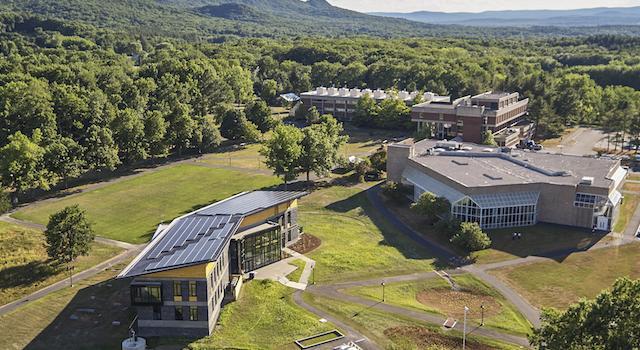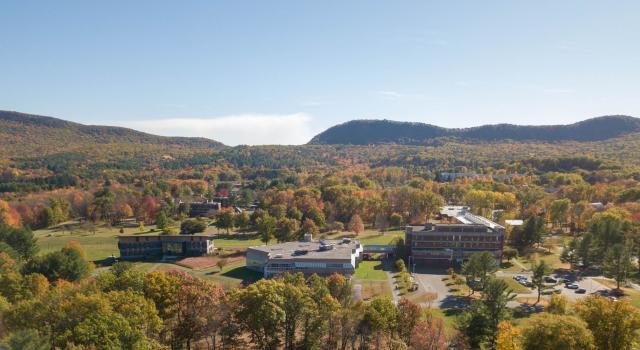Hampshire College Earns STARS Gold Rating for Sustainability
Hampshire College has earned a STARS Gold rating from the Association for the Advancement of Sustainability in Higher Education (AASHE), recognizing the College’s sustainability achievements across academics, operations, leadership, and more. Only some 135 colleges and universities worldwide have earned a Gold or Platinum rating, out of more than 800 in 30 countries that have used the STARS tool, the most widely recognized framework for reporting sustainability performance in higher ed.
This year is the first time the College has submitted data for an official STARS rating. In recent years, the College used the system to relay snapshots of information to either the Princeton Review or Sierra magazine. Hampshire’s STARS report is publicly available on the system’s website.
On June 25 – 26, 2018, Hampshire will partner with AASHE and the Living Future Institute as host of the national Net Positive Symposium for Higher Education (visit the event registration site). The event gathers higher ed sustainability staff and faculty to share ideas and innovations and to explore case studies at Hampshire and nearby colleges of the Living Building Challenge and the Living Community Challenge and their approach to resiliency, health, innovation, and equity.
Since 2011, Hampshire has been focused on transforming its operations, curriculum, food systems, and culture to achieve sustainability. Building on its decades-long practice of environmental science, studies, and stewardship, the College has been steadily achieving its goals. In addition to earning the Gold STAR rating, Hampshire today is
- on track to supply 100 percent of its electricity, on an annualized basis, using on-campus photovoltaic systems, which are rated at 4.9 megawatts DC output
- fully divested from fossil fuels
- promoting sustainable design as the home of higher education’s largest certified Living Building, the R.W. Kern Center (watch the video A Living Laboratory: The R.W. Kern Center)
- increasing the use of its farm and local sources to supply campus food
- operating more efficiently after establishing a Sustainable Revolving Fund to increase investment in and implement energy-saving renovations
- reducing emissions and saving money by returning mowed lawns to natural meadows
- moving closer to achieving the goal of its Climate Action Plan, which is to make the campus climate neutral by 2022
After Hampshire submitted the data that earned its STARS Gold rating, it entered into partnership with four other New England colleges on the purchase of renewable energy from a future solar-power facility in Maine. The new collaboration will enable Hampshire to power its 15 off-campus properties using solar energy and to supplement its on-campus solar-power systems.
“This is the challenge facing our students as they reshape the workforce in the next 20 years: how to turn the U.S. economy into a low-carbon economy,” said Jonathan Lash, who is retiring as president of the College in June. “It may seem like a distant challenge, but for our students, it’s very real and immediate. Spending so much time on campus, they learn not only from what we teach, but also from how we choose to live.”
Unlike other rating or ranking systems, the STARS program is open to all institutions of higher education, and the criteria that determine a rating are accessible to anyone. This year’s submission by Hampshire was organized at the College by Steve Roof, Dane Olson, Todd Holland, Ed Melia, Carl Weber, Marge Dunehew, Joe Anderson, and David Gibson.
Reports from all participating colleges and universities worldwide can be found at https://stars.aashe.org/institutions/participants-and-reports/?sort=rating.
AASHE is an association of colleges and universities that are working to create a sustainable future. For more information, visit www.aashe.org.



